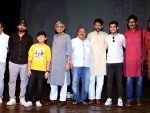21st KIFF International Forum of New Cinema opens on November 15
Let us see what Farhaan Akhtar had in for the title role in Bhaag Milkha Bhaag that fetched him the National Award for Best Actor. Olympian Milkha Singh is one of India’s most iconic athletes. The film is based on his life which has all cinematic elements of drama, irony, tragedy, struggles and triumphs. Farhan transformed his look completely and turned himself into a man with lean body muscle. He went through hard core training for 18 months before shooting began to acquire the original body Milkha Singh had as a young man. “But that had only 40% of what we were working at. The remaining 60% came from proper sleep and a clean diet because I was repeatedly told that our muscles need time to recover and need at least eight hours of sleep,” says Farhaan. He went into hard training, cardio exercises and a strict schedule. “Naturally, some of this tends to spill over into your real life even after the film is over, because the main goal was to increase the endurance,” he sums up.
Kony (1986), a Bengali film, unfolded the story of a very poor but talented young girl living in a slum struggling to find a footing in the competitive world of swimming filled with politics and nepotism. It won the National Award for the Best Feature Film (Bengali) the following year. It was adapted from a story authored by Moti Nandy. In an interview following his Dadasaheb Phalke Award, Soumitra Chatterjee called Kony one of the best films of his career. He recalled the film's catch-phrase "Fight-Koni-fight". His performance as the dedicated but often repressed coach in an against-the-grain characterisation is one of his best.
Breaking Away (1979) offers an unusual glimpse into the world of competitive bicycle racing presented through the perspective of a young, 19-year-old boy and his dalliances with his three other friends who studied together but belong to the stone cutters’ community who are treated in a derogatory manner by youngsters from so-called upper-class families. His aim is to win a Masi bicycle but he is also very fond with Italian music and culture that confuses his simple dad.
The film is ranked eighth on the List of America's 100 Most Inspiring Moviescompiled by the American Film Institute (AFI) in 2006. In June 2008, AFI announced its "Ten top Ten"—the best ten films in ten classic American film genres—after polling over 1,500 people from the creative community. Breaking Away ranked as the eighth best film in the sports genre.
Chariots of Fire I (1981) s considered to be a cult classic which combines the genres of a sports film, a historical film and also, a character-centric film that brings a classic story from the past to present it to the contemporary audience. This resurrects the adventures, struggles and experiences of two athletes who participated in the 1924 Olympics. One was Eric Liddel a devout Scottish Christian who runs for the glory of God and Harold Abrahams an English Jew who runs to overcome prejudice. Running therefore, is the means to a very different end and does not really aim for the medal for its own sake.
The other three films are too well-known and outstanding to be reintroduced to the audience and to cinebuffs. Sports cinema therefore, is not just about sports. It goes far beyond the physical reality of sports as a competitive activity to talk about different struggles in life that go to create a history of its own.
(Reported by Shoma A. Chatterji)
Support Our Journalism
We cannot do without you.. your contribution supports unbiased journalism
IBNS is not driven by any ism- not wokeism, not racism, not skewed secularism, not hyper right-wing or left liberal ideals, nor by any hardline religious beliefs or hyper nationalism. We want to serve you good old objective news, as they are. We do not judge or preach. We let people decide for themselves. We only try to present factual and well-sourced news.







